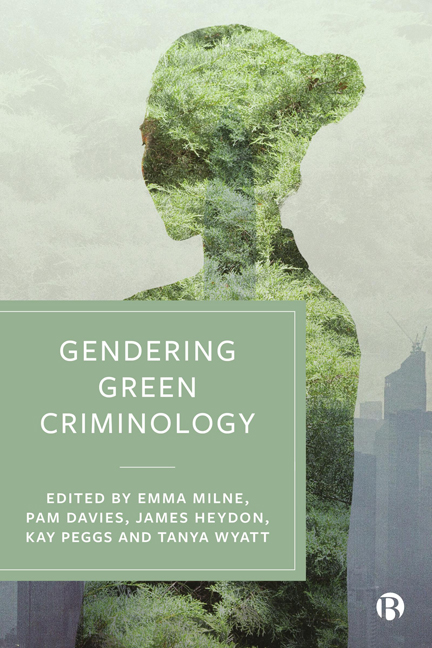1 - Why Gendering Green Criminology Matters
Published online by Cambridge University Press: 28 March 2024
Summary
Introduction
Our ambition for this book is to bring together feminist and green criminology for the first time in a scholarly volume where all contributions are devoted to the project of gendering green criminology. The editorial team is comprised of experts in gender and crime and in green criminology/environmental harm. The idea for the edited collection, and some of the chapters, arose from a conference organised by the editors through the ‘Green Criminology’ and ‘Women, Crime and Criminal Justice’ Networks of the British Society of Criminology. That conference inspired us to expand the discussion and scope of inquiry into the gendering of green criminology.
As a collective of scholars, we cannot help but observe how research in the green criminological field has proliferated. There is a growing body of theoretical thinking and imaginative and robust research arising out of thick descriptive and in-depth narrative accounts, ethnographies and visual methodologies. Much of this newfound knowledge and emerging qualitative data flows from a variety of sources in support of the often distinct, but nevertheless complex, developing picture of the patterns to environmental harms and green crimes and victimisations. The gendered nature of these patterns is especially evident, concerning and often exacerbated by a range of factors. Our starting point – gendering the problems – demands that we properly situate our thinking within a broader intersectional framework where these complex patterns are excavated early in the life of this new direction for green criminology. Consequently, we are confident that this book, Gendering Green Criminology, is a timely publication. Our theoretical perspective thus starts out as feminist and green, and this informs our trilogy of aims. First, while the contents of the volume inevitably present compelling evidence attesting to the gender patterning to, and gendered nature of, green crimes and environmental harms, our aim goes well beyond illustrating these features. Second, we illustrate the gendered impacts of these problems and the gendered nature of harm and victimisation caused and experienced in different contexts and in different parts of the globe. Our ambition extends further so that, third, we examine the gendered nature of resistance and aftermath recovery, thus allowing us to offer an informed critical understanding and appreciation of how to ameliorate the harms currently being experienced.
- Type
- Chapter
- Information
- Gendering Green Criminology , pp. 1 - 14Publisher: Bristol University PressPrint publication year: 2023



